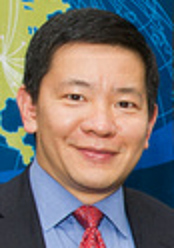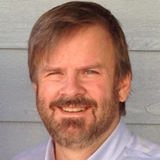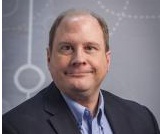Guest Lecturers
The camp will host one of these prominent guest lecturers, the lecture events are open to all faculty, researchers, students, staff and the community. You are all welcome to attend.
Select attendees can also attend and interact virtually by Double Robot © telepresence.
Please contact: Jeanne Tan <jtan7@kent.edu> for reserving your robot.
July 22 and 23, Wednesday/Thursday 2:30 - 5:30pm (MSB 228)
 Dr. Richard Hughes-Jones, Senior Network Advisor, GÉANT
Dr. Richard Hughes-Jones, Senior Network Advisor, GÉANT
GÉANT is the ultrahigh-bandwidth, high-performing communications infrastructure serving all of Europe’s research and education community. It is in the midst of several major cyber instrumentation projects for big sciences. Dr. Hughes-Jones will present Networking the Square Kilometre Array, the building of cyber-connected Square Kilometre Array Observatories (one in South Africa and another in Western Australia) and the three telescopes designed to receive signals from different frequency ranges of the radio spectrum. He will touch on the science that will be investigated, from Probing the Cosmic Dawn, to tests of General Relativity to the Cradle of Life. His second talk will be on GÉANT and Protocol Performance for moving Big Data, the talk will also cover the network and computer architecture issues and how worldwide academic networks are planning to move the astronomical data products to the user community distributed around the world. Dr. Hughes-Jones holds a Ph.D. in particle physics from the University of Manchester, United Kingdom.
July 29 and 30, Wednesday/Thursday 2:30 - 5:30pm (MSB 228)
 Dr. Brian Wee, Director of Strategic Alliances, NEON (NATIONAL ECOLOGICAL OBSERVATORY NETWORK)
Dr. Brian Wee, Director of Strategic Alliances, NEON (NATIONAL ECOLOGICAL OBSERVATORY NETWORK)
NEON is a National Science Foundation (NSF) funded continental-scale, cyber-enabled ecological Observatory now under construction by NEON Incorporated. NEON’s purpose is to gather and serve comprehensive open ecological data on the impacts of climate change, land use change, and invasive species on natural resources, biodiversity and major ecological processes. Dr. Wee serves as NEON’s liaison to Congress and to U.S. federal agencies. His first talk on Wednesday, Enabling Continental-Scale Ecological Forecasting, will include information about NEON’s architecture and how it enables scientists, educators and decision-makers to advance the understanding of large-scale ecological processes. Thursday’s talk, Informatics, Science and Policy frontiers on the Domestic and International Scenes, will discuss the role of the United States in environmental science and technology leadership, and the current thinking about the future of global ecological science. Dr. Wee holds a Ph.D. in ecology, evolution and behavior, a M.Sc. in computer science - artificial intelligence, and a B.Sc. in information systems and computer science.
August 5, Wednesday, 2:30 - 5:30pm (MSB 228)
 Dr. Gregory DeLozier, Research Computer Scientist from PROGRESSIVE INSURANCE CORPORATION
Dr. Gregory DeLozier, Research Computer Scientist from PROGRESSIVE INSURANCE CORPORATION
Progressive Corporation is one of the largest auto insurance groups in the country. Headquartered in Cleveland, Ohio, Progressive deals with all spheres of data and is an intense user of enormous amounts of information. The challenge of managing data has become a focus for them and in 2001 the company built their Ohio corporate center to Tier IV standards, making it one of the first in the state. Dr. DeLozier’s presentation, Challenges of Introducing New Technology at Critical Enterprise Scale, will delve into the process of continuously introducing new technology, including big data tools, into massive enterprise environments. CIBD Camp students will have the opportunity to visit the Progressive Data Center and Research Facility. Dr. DeLozier completed his Ph.D. in computer science at Kent State University.
August 11, Tuesday, 2:30 - 5:30pm (MSB 228)
 Dr. David Hudak, Director at OHIO SUPERCOMPUTER CENTER (OSC)
Dr. David Hudak, Director at OHIO SUPERCOMPUTER CENTER (OSC)
The web has become the dominant access mechanism for remote computer services in every computing area except high-performance computing (HPC). Accessing HPC cyberinfrastructure (CI) resources today, either at the campus or national level, typically requires advanced knowledge of UNIX, familiarity with command-line interfaces and installation and configuration of custom client software. These additional requirements create an accessibility gap for HPC. The Ohio Supercomputer Center (OSC) is a leader in CI solutions for HPC. This talk will cover two major OSC CI projects: OSC OnDemand and AweSim. OSC OnDemand is a web platform providing OSC users integrated access to HPC systems, web applications and VNC services. AweSim is a partnership between OSC, simulation and engineering experts, and industry to provide small to mid-sized manufacturers with simulation-driven design to enhance innovation and strengthen economic competitiveness. Dr. Hudak earned his graduate degrees in computer engineering from the University of Michigan.
Talk date: August 12, Wednesday, 1:00 - 3:00pm (MSB 228)
 Dr. Ruoming Jin, Associate Professor, Department of Computer Science, KSU
Dr. Ruoming Jin, Associate Professor, Department of Computer Science, KSU
There is an evolving ecosystem of innovation surrounding the explosion of big data analysis and Dr. Jin is right in the middle of it. As a big data entrepreneur, his presentation will focus on the latest developments, opportunities and challenges in big data analytics. Dr. Jin will talk about the techniques for scalable data mining, data stream processing, massive graph mining, approximate query processing and high performance computing. He will give his advice on how computer scientists should position themselves to be competitive players in this developing revolution. Dr. Jin’s research is well funded by the National Science Foundation and includes Small Business Innovation Research funds. Ruoming Jin received his Ph.D. from The Ohio State University.
